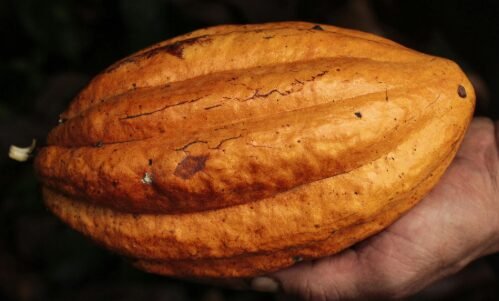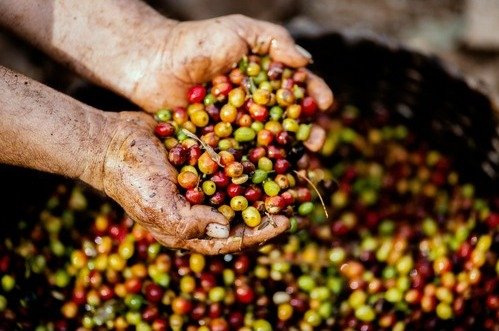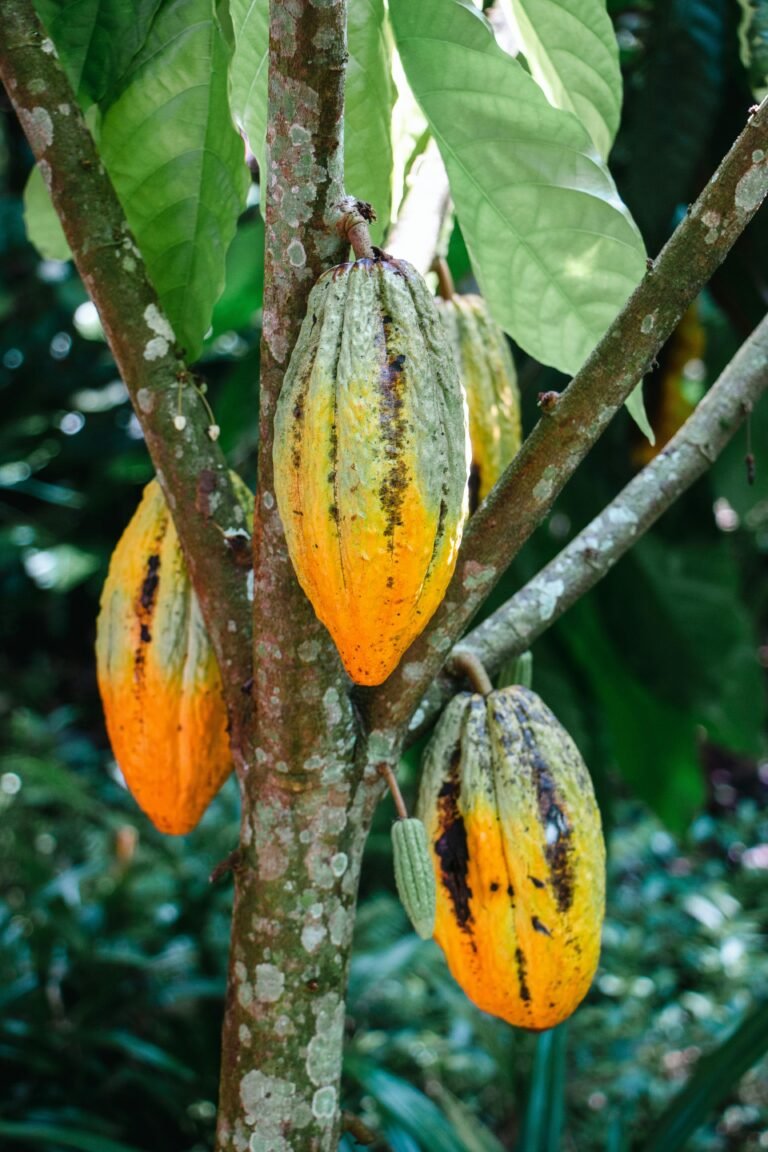So many people start their day with coffee, which is one of the most popular beverages worldwide. But, nowadays, peoples interest is also shifting toward cacao, a rich and healthy alternative that also gives a natural energy boost.
While coffee has been a morning choice for centuries, cacao is quickly becoming a trendy choice for its high nutritional content.
In this article, we’ll compare both to help you decide which one suits your lifestyle best.
So, let’s start with the beans first. Let’s first know the difference between coffee beans and cacao beans. So, there we go…
What is the Difference Between Cacao and Coffee Beans?
Before knowing the difference between cacao and coffee beans, now many of you might be wondering, what are beans?
Interestingly, the seeds of both cacao and coffee are known as beans, even though they are not true beans in botanical terms.
Here is a difference between Cacao Beans and Coffee Beans:
| Cacao Bean | Coffee Bean |
Cacao beans come from cacao pod.  | Coffee beans come from coffee cherry  |
| Originated from theobroma cacao tree, South America | Originated from coffee plant, Ethiopia |
| The processing steps are: Harvesting, Fermentation, Roasting, then Grinding | Same as cacao |
| It’s a recent trend | It’s a traditional beverage |
| Rich and chocolatey flavour with chocolatey aroma | Bitterness and earthy flavour with nutty or smoky aromas. |
| Provide impressive health benefits due to its high antioxidant | Provide health benefits, which may vary depending on the type |
The difference between cacao and coffee, begins with a bean, two beans actually, one from a cacao pod and the other from a coffee cherry fruit.
It takes a long process for both coffee and cacao beans to end up in your cup.
The journey from bean to brew is almost similar for both.
First the beans are harvested then fermented, after that, comes the crucial roasting process. During the roasting process, heat transforms the beans, and develops the flavours and aromas.
After roasting, the beans are ground into fine powder. This is the fine powder you will use to make your favourite beverage.
Now coming to the most popular question,
How much caffeine in cacao vs coffee?
In the table below, we have shared a comparison between cacao and coffee in terms of caffeine content.
| Beverage | Caffeine Content per Cup |
|---|---|
| Cacao | 24 mg |
| Coffee | 95–100 mg |
| Difference | 71–76 mg less in cacao |
This table highlights the significant difference in caffeine content between cacao and coffee.
Cacao has significantly less caffeine than coffee (71–76 mg less caffeine content in one cup cacao compared to one cup coffee); it is considered a milder alternative. which is a key reason why some people prefer cacao as a lower-caffeine alternative to coffee.
On the other hand, coffee has a high caffeine content; it is commonly used for a strong energy boost.
Is Cacao More Bitter than Coffee?
No, cacao is generally less bitter than coffee.
Cacao and coffee each have their own special taste.
Cacao tastes rich and chocolatey with a strong, chocolatey aroma. It has a gentle bitterness with hints of fruit, flowers, and nuts. Cacao is thick and smooth; it’s almost like a dark chocolate in your cup in liquid form. Many people enjoy it just the way it is, without adding any external additives.
On the other hand, coffee has a stronger and more bitter taste with earthy and coffee aromas. Coffee tastes like earthy and sometimes has a woody or citrus flavour. It’s usually thinner and more watery. Some people love its strong bitter flavour, while others add milk or sugar to make it softer.
Cacao and coffee – both drinks are full of flavour, but they feel and taste very different.
Which has more Antioxidants, Coffee or Cacao?
Cacao has more antioxidants than coffee; therefore, it’s a superior alternative for the people who want to get more antioxidants.
Cacao and coffee are both good for you, but cacao has more polyphenols and flavonoids, which are antioxidants.
Cacao also has other antioxidants that are good for you, such as epicatechin and catechin.
Cacao also has a lot of key minerals, including magnesium, iron, zinc, selenium, fibre, which are good for your overall health. Here you can read the detailed Health Benefits of Pure Cacao Powder.
On the other hand, coffee also provides antioxidants, especially hydrocinnamic acids and some polyphenols. But coffee has a smaller amount of antioxidants compared to cacao.
There are some specific antioxidants found in coffee that are good for your health. These include chlorogenic acids, caffeic acid, and ferulic acid. These antioxidants may help reduce inflammation, support heart health and protect the body from oxidative stress.
Cacao and Coffee Calories
Cacao powder has more calories than coffee powder when you compare the same amounts.
A quarter-cup of cacao powder has about 72 calories, plus 5 grams of protein and 3 grams of fat.
On the other hand, a teaspoon of instant coffee has only around 4 calories and very little protein or fat.
Coffee powder by itself doesn’t add many calories—most of the calories in a coffee drink come from things like milk, cream, or sugar.
So, cacao powder has a much higher calorie content than coffee powder. To know more about calorie content, you can check this site, fatsecret.
Cacao vs Coffee Health Benefits
Cacao and coffee both are well known for their flavour, health benefits and mainly energy boosting properties. Cacao and coffee both have some similarities, but they also have some unique qualities that might make one a better choice for you, depending on what you’re looking for.
Through the table below, we have highlighted the key health benefits and differences between Cacao and Coffee:
| Cacao | Coffee |
| The main compounds are: Flavonoids and Theobromine | The main compounds are: Chlorogenic acids and Caffeine |
| Acts as a mild energy boost | Acts as a strong energy boo |
| Improves mood: Yes | Improves mood: Yes |
| Supports heart health via flavonoids | Supports heart health via antioxidants contained in coffee |
| Improves memory and focus | Enhances alertness and may protect brain health |
| Potential Risks: Digestive problems if consumed excessively | Potential Risks: Sleep disruption, anxiety, caffeine dependency |
The main antioxidant compounds that are found in high amounts in cacao are flavonoids and theobromine.
On the other hand, the main key component found in coffee is chlorogenic acid, an antioxidant.
Cacao is preferred by those who are looking for a mild energy boost, as it has low caffeine compared to coffee.
Coffee is for those who want a high and instant energy boost.
Cacao and coffee both contain different antioxidant properties that can support heart health.
Cacao and coffee: they both provide cognitive benefits in different ways. They also have some side effects if you consume it in excess, such as bloating, digestive issues, sleep disruption, and anxiety.
Note:
- Cacao is ideal for those who are looking for a gentle energy boost, improve mood, and also want to get additional antioxidant and nutritional benefits.
- Coffee is suitable for those who are looking for a quick and strong boost in energy and mental alertness, primarily due to its higher caffeine content.
Between cacao and coffee, you can choose any one in a moderate quantity, depending on your preferences, nutrient intake goal, personal health goals, and caffeine sensitivity.
Final words:
We believe this information has given you a clear understanding of the difference between cacao and coffee.
Please note that this article is only for educational purposes. This content should not be considered as a substitute for medical related advice.
If you have any concerns regarding your health and diet, you are advised to consult a qualified nutritionist or health care professional.
You may also like to read:



